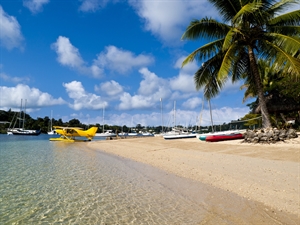A multi-stop sailing trip can be complicated when it comes to your health.
1. Organize your vaccinations
Look at your detailed itinerary around 12 weeks before you travel and check which vaccinations you might need for each of your stops. The most up-to-date advice is available at Global Health Clinics. These travel clinics can offer same-day appointments and it’s best to book a double consultation when it comes to complicated multi-stop trips. If your travel plans change at the last minute, book a follow-up appointment for further advice. If you’re travelling to an area with a malaria risk, you’ll need anti-malarial medication and mosquito repellent too.
2. Avoid stomach bugs
Bugs are nasty at the best of times but the last place you’ll want to be sick is on a boat. The best way to protect yourself is by washing your hands properly and regularly. Carry hand sanitizer with you at all times, make sure you cook your food thoroughly and be careful about what you’re eating in port.
3. Treat minor wounds
Clambering around on a yacht can lead to all sorts of cuts and scrapes and you should pay attention to even small abrasions on your skin. In hot and damp conditions, bacteria can bloom into something nasty if untreated. Treat it straight away with a mild antiseptic, keep it covered while in sea water and rinse in fresh water after a swim.
4. Stop seasickness
The fear of seasickness could be putting you off sailing but there are steps you can take. For the first few hours, avoid going below deck for too long. Look out at the horizon and give your brain time to adjust. Don’t read a book or stare at a screen, get as much fresh air as possible, drink plenty of water and pack acupressure bands and ginger biscuits. Although it may feel like it, seasickness can’t kill you and usually goes away after a couple of days.
5. Avoid sunburn and sunstroke
Even though the ocean breeze feels cool, the effects of the sun’s rays are stronger at sea. Apply a high SPF sunscreen liberally and often, reapplying after every swim. Know when you’ve had enough sun and get into the shade at the hottest time of the day. Drink plenty of water to avoid dehydration and wear a hat at all times. For further information about sun safety, visit the NHS Fit for Travel website.
6. Be prepared
If you have an existing medical condition it’s vital you bring an adequate supply of any medication you may need. Even a good first aid kit will have a limited supply of medication. Accidents can happen, and you’ll be a long way from help so it’s well worth getting some specialist first aid training. Always consult your doctor before travelling if you have a medical condition or a serious allergy and make sure you are fully covered by upgrading your travel insurance.


Book Online